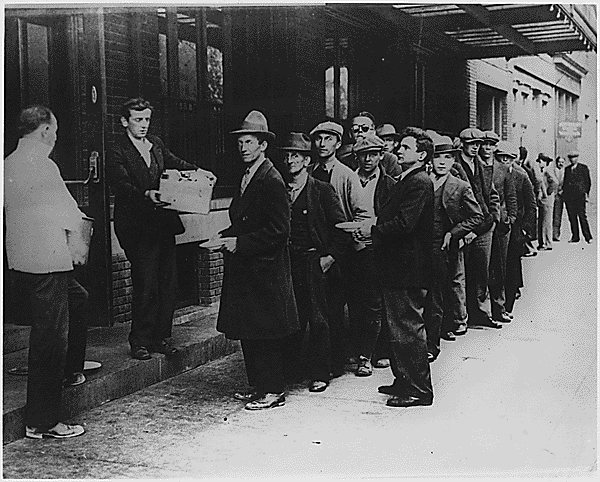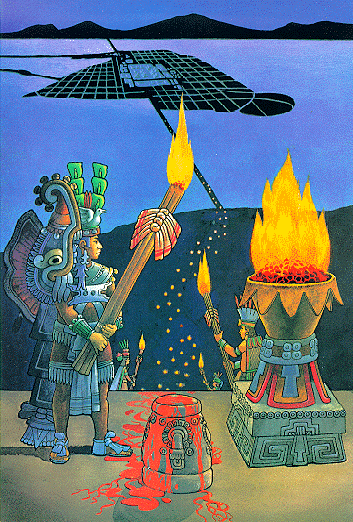 Another Stereotype of the Month entry:
Another Stereotype of the Month entry:
 Another Stereotype of the Month entry:
Another Stereotype of the Month entry:
On Columbus Day, Celebrate Western Civilization, Not Multiculturalism
By Michael Berliner
October 13, 2003
Columbus Day this year has a special meaning. Christopher Columbus is a carrier of Western civilization and the very values attacked by terrorists two years ago on September 11. To the "politically correct," Columbus Day is an occasion to be mourned. They have mourned, they have attacked, and they have intimidated schools across the country into replacing Columbus Day celebrations with "ethnic diversity" days.
The politically correct view is that Columbus did not discover America, because people had lived here for thousands of years. Worse yet, it's claimed, the main legacy of Columbus is death and destruction. Columbus is routinely vilified as a symbol of slavery and genocide, and the celebration of his arrival likened to a celebration of Hitler and the Holocaust. The attacks on Columbus are ominous, because the actual target is Western civilization.
Did Columbus "discover" America? Yes—in every important respect. This does not mean that no human eye had been cast on America before Columbus arrived. It does mean that Columbus brought America to the attention of the civilized world, i.e., to the growing, scientific civilizations of Western Europe. The result, ultimately, was the United States of America. It was Columbus's discovery for Western Europe that led to the influx of ideas and people on which this nation was founded—and on which it still rests. The opening of America brought the ideas and achievements of Aristotle, Galileo, Newton, and the thousands of thinkers, writers, and inventors who followed.
Prior to 1492, what is now the United States was sparsely inhabited, unused, and undeveloped. The inhabitants were primarily hunter-gatherers, wandering across the land, living from hand-to-mouth and from day-to-day. There was virtually no change, no growth for thousands of years. With rare exception, life was nasty, brutish, and short: there was no wheel, no written language, no division of labor, little agriculture and scant permanent settlement; but there were endless, bloody wars. Whatever the problems it brought, the vilified Western culture also brought enormous, undreamed-of benefits, without which most of today's Indians would be infinitely poorer or not even alive.

Columbus should be honored, for in so doing, we honor Western civilization. But the critics do not want to bestow such honor, because their real goal is to denigrate the values of Western civilization and to glorify the primitivism, mysticism, and collectivism embodied in the tribal cultures of American Indians. They decry the glorification of the West as "cultural imperialism" and "Eurocentrism." We should, they claim, replace our reverence for Western civilization with multi-culturalism, which regards all cultures (including vicious tyrannies) as morally equal. In fact, they aren't. Some cultures are better than others: a free society is better than slavery; reason is better than brute force as a way to deal with other men; productivity is better than stagnation. In fact, Western civilization stands for man at his best. It stands for the values that make human life possible: reason, science, self-reliance, individualism, ambition, productive achievement. The values of Western civilization are values for all men; they cut across gender, ethnicity, and geography. We should honor Western civilization not for the ethnocentric reason that some of us happen to have European ancestors but because it is the objectively superior culture.
Underlying the political collectivism of the anti-Columbus crowd is a racist view of human nature. They claim that one's identity is primarily ethnic: if one thinks his ancestors were good, he will supposedly feel good about himself; if he thinks his ancestors were bad, he will supposedly feel self-loathing. But it doesn't work; the achievements or failures of one's ancestors are monumentally irrelevant to one's actual worth as a person. Only the lack of a sense of self leads one to look to others to provide what passes for a sense of identity. Neither the deeds nor misdeeds of others are his own; he can take neither credit nor blame for what someone else chose to do. There are no racial achievements or racial failures, only individual achievements and individual failures. One cannot inherit moral worth or moral vice. "Self-esteem through others" is a self-contradiction.
Thus the sham of "preserving one's heritage" as a rational life goal. Thus the cruel hoax of "multicultural education" as an antidote to racism: it will continue to create more racism. Individualism is the only alternative to the racism of political correctness. We must recognize that everyone is a sovereign entity, with the power of choice and independent judgment. That is the ultimate value of Western civilization, and it should be proudly proclaimed.
Dr. Berliner is a member of the Board of Directors of the Ayn Rand Institute (www.aynrand.org) in Irvine, CA.

A correspondent replies
From correspondent Jason Spaulding:
This repeats many of the ignorant ideas of Eurocentrist dittoheads. What part of 500 nations don't they understand?
Sparsely inhabited? Indeed, some portions were, especially after European microbes killed 90 or 95% of the pre-contact populations.
Tenochtitlán (Mexico City) was bigger and much cleaner than any city in Europe.
Until the introduction of metal weapons and firearms, pre-contact skirmishes in much of the present US were minor. Warfare was unknown in most of California, for example.
Some tribes had slavery, but nothing like the crushing hereditary oppression introduced by the Europeans.
To students without a need to justify their prejudices, I recommend:
Facing East from Indian Country: A Native History of Early America by Daniel K. Richter
A short form is a poster I've seen around:
Before 1492, in America there was no unemployment, no poverty and the women did the hard work. The white man thought he could improve this.
BTW, probably the best known member of the "Objectivist" cult of Ayn Rand is Alan Greenspan.
Note also the ur-fascist tendency to define multiculturalism in negative terms, such as expiation of guilt.

Rob's reply
I rebutted Berliner once before—in This Ain't No Party: A Columbus Day Rant. Since Berliner hasn't come up with any new arguments since 1992, my rebuttal remains valid. But let's shred Berliner's latest screed against multiculturalism to pieces.
>> Christopher Columbus is a carrier of Western civilization and the very values attacked by terrorists two years ago on September 11. <<
Which values are those? Greed, arrogance, self-righteousness?
Typhoid Mary was also a carrier of the "benefits" of Western civilization—i.e., poverty-inducing pestilence—but we don't celebrate her.
>> To the "politically correct," Columbus Day is an occasion to be mourned. <<
See Political Correctness Defined for a rebuttal of the "political correctness" charge.
>> Did Columbus "discover" America? Yes—in every important respect. This does not mean that no human eye had been cast on America before Columbus arrived. <<
It does mean that to ignoramuses who don't know any better.
>> It does mean that Columbus brought America to the attention of the civilized world, i.e., to the growing, scientific civilizations of Western Europe. The result, ultimately, was the United States of America. <<
Uh, yes, after the American colonists revolted against the "growing, scientific civilizations of Western Europe." Apparently these civilizations weren't all they were cracked up to be.
>> It was Columbus's discovery for Western Europe that led to the influx of ideas and people on which this nation was founded—and on which it still rests. <<
Those ideas include discrimination based on race, religion, creed, class, gender, and country of origin, presumably. Because these ideas are hallmarks of Western civilization. (See When Did Racism Begin? for more on the subject.)
As everyone but Berliner seems to know, the Pilgrims fled Europe's Western civilization to escape religious persecution. They wanted to set up a theocracy and Western civilization wasn't multicultural enough to allow that.
>> The opening of America brought the ideas and achievements of Aristotle, Galileo, Newton, and the thousands of thinkers, writers, and inventors who followed. <<
Aristotle's ideas were lost until Islamic scholars reintroduced them to Western civilization. Galileo was deemed a heretic by Western civilization.
Newton's discoveries came well after the "opening of America." He made good use of the concept of zero, which the Muslims and Maya invented independently but the Europeans didn't.
The Indians also understood the ideas of liberty and justice before the Europeans arrived. Which may explain why Berliner didn't list liberty and justice as European inventions. In fact, the Indians taught the aristocratic and authoritarian Europeans about these subjects. See Indians Gave Us Enlightenment for more on the subject.

>> Prior to 1492, what is now the United States was sparsely inhabited, unused, and undeveloped. <<
Yeah, and a developed country is so much better than an undeveloped one. That's why we all love crowding into cities and onto freeways, and hate the wide open spaces embodied in our national parks. More development, please!
>> The inhabitants were primarily hunter-gatherers, wandering across the land, living from hand-to-mouth and from day-to-day. <<
That Indians were "primarily" hunter-gatherers and wanderers is debatable. Now that Western civilization dominates the globe, how many people in the US and the world are still living from hand to mouth and from day to day? Hint: Lots.
>> There was virtually no change, no growth for thousands of years. <<
And no kings, popes, Dark Ages, Crusades, Inquisitions, Hundred Years Wars, or Black Deaths. If these are examples of change or growth, I'll take stagnation.
Indians had no culture?
>> there was no wheel, no written language, no division of labor, little agriculture and scant permanent settlement; but there were endless, bloody wars. <<
False, false, false, false, false, and false. (Native civilizations knew about the wheel, but chose not to use it. For one thing, they didn't have horses or cattle to pull wheeled wagons.) See The Myth of Western Superiority for more on the subject.
>> Whatever the problems it brought, the vilified Western culture also brought enormous, undreamed-of benefits, without which most of today's Indians would be infinitely poorer or not even alive. <<
That's pretty funny considering Western civilization's diseases killed some 90% of the Indians and its weapons killed or curtailed the rest of them. In fact, there were many more Indians before Columbus than there are now, so it's indisputable that Western civilization has been worse for them. Unless you believe the only good Indian is a dead Indian, I guess.

>> We should, they claim, replace our reverence for Western civilization with multi-culturalism, which regards all cultures (including vicious tyrannies) as morally equal. In fact, they aren't. Some cultures are better than others: a free society is better than slavery; reason is better than brute force as a way to deal with other men; productivity is better than stagnation. <<
Multiculturalism means all civilizations have worth. It doesn't necessarily mean that they're all morally equal.
Of course, Western civilization practiced slavery on a greater scale than any other civilization in history. It conducted the deadliest wars in history; both sides in World Wars I and II were products of Western civilization. It won those wars with brute force, not reason: the firebombing of Dresden and Tokyo, the nuking of Hiroshima and Nagasaki. We're now engaged in a brute-force war against "terrorism" in Afghanistan and Iraq, having explicitly rejected reason as a solution.
Among the "vicious tyrannies" the West has supported are the Shah's Iran, Saddam Hussein's Iraq, Saudi Arabia, Pakistan, and so forth and so on. And Western civilization itself was composed of vicious tyrannies led by vicious tyrants throughout most of its history. Even its recent history. Do the names Napoleon, Bismarck, Lenin, Franco, Hitler, Mussolini, and Stalin ring a bell?
How about King George the III? "The history of the present King of Great Britain is a history of repeated injuries and usurpations, all having in direct object the establishment of an absolute Tyranny over these States." Oh, my. Has anyone told Berliner that Western civilization produced an "absolute Tyranny"—according to Thomas Jefferson, one of its leading lights?
Simply staying alive is a productive use of one's time and energy. But Indians produced great works from Cahokia to Chaco Canyon to Tenochtitl´n. What did the typical European do that was better? For every Aristotle, Galileo, or Newton, there must've been a hundred million Europeans who lived short and brutish lives.
Saying Indians were enthralled, brutish, or idle sounds like saying they were subhuman. Or more tellingly, like saying they were animals. Berliner sounds like a racist, pure and simple.
>> In fact, Western civilization stands for man at his best. <<
In Berliner's opinion, obviously. And in the opinion of ancestor-worshipping theocrats like Ronald Reagan and George W. Bush. But the proof is in actions, not words.

>> It stands for the values that make human life possible: reason, science, self-reliance, individualism, ambition, productive achievement. <<
This is pure racism, or perhaps pure tripe. To give one example, "human life" flourished for some millions of years before the advent of science. How was that possible if it required science?
What exactly were the ambitions and productive achievements of millennia of early hominids? What makes Berliner think they worked individually and relied on themselves rather than on each other? What is a tribe or a band but a collective group formed to make self-reliance unnecessary? (See The Myth of American Self-Reliance for more on the subject.)
Is Berliner saying great civilizations can't be based on faith and religion? That's funny since the only cultures that have explicitly excluded God were Russia, China, and their satellites. Is Berliner a godless communist?
Ironically, those cultures stressed productivity, hard work, and the rationality of Marxism to the exclusion of other values. The whole concept of a "worker's paradise" is a paean to these values. One would have to conclude that communism is closest to Berliner's ideal.
In reality, the whole point of civilization is collective action: to provide for the common defense and promote the general welfare. There's no such thing as a civilization of uncollected individuals. "Civilization" must be another word Berliner doesn't understand.
Western civ is the best?
>> We should honor Western civilization not for the ethnocentric reason that some of us happen to have European ancestors but because it is the objectively superior culture. <<
Objectively superior by what standard? Number of genocides? Murder rates? Disparity between rich and poor? Let's ask the Holocaust's victims how they feel about Western civilization's achievements.
Or perhaps the standard is our civilization's storytelling capability? Its length of survival? Its happiness? These questions show how asinine Berliner's concept of "objectivity" is. He can't define a standard that's objective rather than subjective.
What if Western civilization were superior by some standard? Berliner hasn't begun to analyze why that outcome might have happened. Fortunately, Jared Diamond did so in his revealing Guns, Germs, and Steel. As he explained, the West had several natural biological and geographic advantages that had nothing to do with its worldview. It lucked out, basically.
One could come up with other reasons the West has achieved more by some standards. How about Eurasia's having 10 or 100 times as many people as the Americas? With that disparity, of course the West produced more inventors, artists, and philosophers. It also produced more peasants, serfs, and slaves.

>> Underlying the political collectivism of the anti-Columbus crowd is a racist view of human nature. They claim that one's identity is primarily ethnic: if one thinks his ancestors were good, he will supposedly feel good about himself; if he thinks his ancestors were bad, he will supposedly feel self-loathing. <<
Wow. How many ways can one dispute Berliner's foolish claim?
1) Berliner doesn't seem to know the definition of racism, which is discrimination on the basis of race. If I think my ancestors are good, it doesn't mean I think they're better than non-ancestors of the same race. Or better than non-ancestors of another race. In fact, it doesn't mean my ancestors are all of one race.
2) I guess every civilization that worships its ancestors is wrong to do so? Or is it every person who worships his or her ancestors? Should we pave over Arlington National Cemetery and put up a parking lot? What is Arlington except a feel-good monument to our ancestors—a way to collectively worship past achievements that we did nothing to merit ourselves?
3) Berliner's comment is ironic considering how he and his ilk worship the Greeks, the Founding Fathers, and other icons of Western civilization. Why celebrate the Fourth of July or Thanksgiving if we don't get any benefit from basking in our ancestors' glory? I guess a lot of Americans need Berliner's "wisdom" to help them get over their obsession with waving flags and reciting pledges, since these are more group activities that confer imaginary blessings on the individual.
>> But it doesn't work; the achievements or failures of one's ancestors are monumentally irrelevant to one's actual worth as a person. <<
This is hysterical considering Berliner has spent his whole essay touting the achievements of Western civilization. He obviously feels good that he's a product of such a civilization. But at the same time, he doesn't think anyone should feel that way. Can you say "muddled thinking"?
Berliner apparently missed all the emotional responses to 9/11. Millions of Americans mourned their hallowed dead, invoked their founding ancestors, and declared themselves a united whole. I didn't hear a single person proclaim himself an individual rather than part of a collective.
Berliner's screed is fatally flawed by its premise. Apparently, he believes a civilization of a billion people isn't "collectivist" but a band of hundred people is. Unfortunately for this simpleton, the truth is the opposite.
Related links
Culture and Comics Need Multicultural Perspective 2000
Multicultural origins of civilization
Greek lies, historic truth
America's cultural mindset
|
. . . |

|
All material © copyright its original owners, except where noted.
Original text and pictures © copyright 2007 by Robert Schmidt.
Copyrighted material is posted under the Fair Use provision of the Copyright Act,
which allows copying for nonprofit educational uses including criticism and commentary.
Comments sent to the publisher become the property of Blue Corn Comics
and may be used in other postings without permission.